|
|
 |
|
Calanoida ( Order ) |
|
|
|
Clausocalanoidea ( Superfamily ) |
|
|
|
Phaennidae ( Family ) |
|
|
|
Cornucalanus ( Genus ) |
|
|
| |
Cornucalanus chelifer (Thompson, 1903) (F,M) | |
| | | | | | | Syn.: | Scolecithrix chelifer I.C. Thompson, 1903 a (p.21, Descr. juv.M, figs. juv.M); Farran, 1905 (p.36, figs.F); Pearson, 1906 (p.19);
Cornucalanus magnus Wolfenden, 1905 a (p.21); 1911 (p.281, figs.F,M); Hardy & Gunther, 1935 (1936) (p.163, Rem.);
Onchocalanus chelifer : van Breemen,1908 a (p.65);
? Cornucalanus chelifer : Sewell, 1929 (p.177, figs. Juv.M); | | | | Ref.: | | | Farran, 1908 b (p.49, Rem.); With, 1915 (p.222, figs.F,M); Lysholm & Nordgaard, 1921 (p.19); Sars, 1925 (p.151, figs.F); Rose, 1929 (p.26); Wilson, 1932 a (p.74, figs.F,M); Rose, 1933 a (p.138, figs.F, Rem.M); Jespersen, 1934 (p.84, fig.21); 1940 (p.35); Lysholm & al., 1945 (p.25); Vervoort, 1957 (p.90, 91, 92, Rem.); Tanaka, 1960 a (p.121, figs. juv.M); Paiva, 1963 (p.44, fig.M); Vervoort, 1965 (p.33, Rem.); Owre & Foyo, 1967 (p.58, figs.F,M); Park, 1983 a (p.352, figs.F,M, Rem.); Tanaka & Omori, 1992 (p.257, figs.F); Bradford & al., 1983 (p.61, figs.F,M); Chihara & Murano, 1997 (p.853, Pl.139: F); Bradford-Grieve & al., 1999 (p.880, 929, figs.F,M); G. Harding, 2004 (p.41, figs.F,M); Boxshall & Halsey, 2004 (p.159, fig.F); Vives & Shmeleva, 2007 (p.683, figs.F,M, Rem.) | 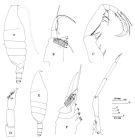 issued from : J.M. Bradford, L. Haakonssen & J.B. Jillett in Mem. N.Z. Oceanogr. Inst., 1983, 90. [p.66, Fig.36]. Female: A, habitus (lateral right side); B, Mx2; C, Mxp;, D, P5. Male: E, habitus (lateral right side); F, Mx2; G, P5.
|
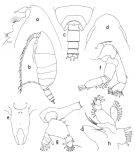 issued from : T. Park in Antarct. Res. Ser. Washington, 1983, 39 (5). [p.357, Fig.25]. Male: a, habitus (dorsal); b, idem (lateral left side); c, last thoracic segments and urosome (lateral left side); d, forehead (lateral); e, Rostrum; f, A2; g, Md; h, Mx1.
|
 issued from : T. Park in Antarct. Res. Ser. Washington, 1983, 39 (5). [p.358, Fig.26]. Male: a, Mx2; b, Mxp; c, basipod of P4 (anterior); d, proximal part of P5 (anterior); e, P5 (posterior).
|
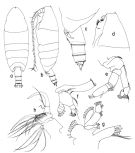 issued from : T. Park in Antarct. Res. Ser. Washington, 1983, 39 (5). [p.355, Fig.23]. Female: a, habitus (dorsal); b, idem (lateral left side); c, last thoracic segments and urosome (lateral left side); d, forehead (lateral); e, A2; f, Md; g, Mx1; h, Mx2.
|
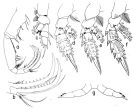 issued from : T. Park in Antarct. Res. Ser. Washington, 1983, 39 (5). [p.356, Fig.24]. Female: a, Mxp; b, distal part of Mxp; c, P1 (anterior); d, P2 (posterior); e, P3 (posterior); f, P4 (posterior); g, P5 (posterior).
|
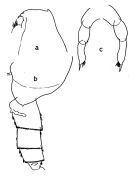 issued from : O. Tanaka & M. Omori in Publs Seto Mar. Biol. Lab., 1992,35 (4/5). [p.257, Fig.2, a-c]. Female (from Izu region, Japan): a, forehead (lateral); b, last thoracic segment and urosome (lateral left side); c, P5. Nota: P5 with a single terminal spine and patches of hairs.
|
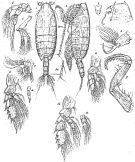 Issued from : G.O. Sars in Résult. Camp. Scient. Prince Albert I, 69, pls.1-127 (1924). [Pl.WLII, figs.1-14]. Female: 1, habitus (dorsal); 2, idem (lateral left side); 2a, distal segments of A1; 3, forehead (lateral); 4, rostrum (frontal view); 5, A2; 6, Md; 7, Mx1; 8, Mx2; 9, Mxp; 10, P1; 11, P2; 12, P3; 13, P4; 14, P5.
|
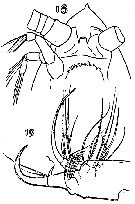 issued from : G.P. Farran in Ann. Rep. Fish. Brch., Ireland, 1902-1903, II, App. 2, 1905. [Plate VII, Figs.18-19]. As Scolecithrix cheliferFemale (from W Ireland): 18, head (ventral); 18, Mx2.
|
 issued from : R.N. Wolfenden in Die Marinen Copepoden der Deutschen Südpolar-Expedition 1901-1903, 1911. [p.282, Fig.45]. As Cornucalanus magnus. Male: P5.
|
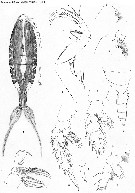 issued from : R.N. Wolfenden in Die Marinen Copepoden der Deutschen Südpolar-Expedition 1901-1903, 1911. [Pl.XXXII, Figs.1-10]. As Cornucalanus magnus. Female: 1, habitus (dorsal); 2, Mx2; 3, Mxp; 4, P1; 5, P2; 6, P4; 7, forehead (lateral); 8, P5; 9, posterior part cephalothorax and urosome (lateral). Male: 10, forehead (lateral).
|
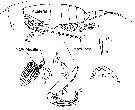 issued from : G. Harding in Key to the adullt pelagic calanoid copepods found over the continental shelf of the Canadian Atlantic coast. Bedford Inst. Oceanogr., Dartmouth, Nova Scotia, 2004. [p.41]. Female & Male. Female with a median frontal spine foreward (arrowed). Both Mx2 and Mxp have two stout claw-like setae (arrowed). P5 uniramous, small, 3-segmented. Male: P5 uniramous, small, 4-segmented.
|
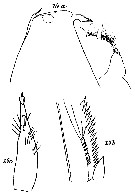 issued from : C. With in The Danish Ingolf-Expedition, Copepoda I, 1915, III, 4. [Pl. VIII, Fig. 15, a-c]. Female (from 61°30'N, 17°08'W): a, head (lateral); b, terminal setae of left P4; c, left P5.
|
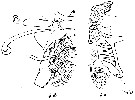 issued from : C. With in The Danish Ingolf-Expedition, Copepoda I, 1915, III, 4. [Pl. VII, Fig. 4, e, d]. Female: e, labrum (oral view); d, serrula 6-dentata.
|
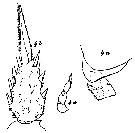 issued from : C. With in The Danish Ingolf-Expedition, Copepoda I, 1915, III, 4. [Pl. VII, Fig. 4, a-c]. Female: a, corner of last thoracic segment and urosome (lateral); b, left P4 (posterior view); c, right P5.
|
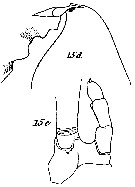 issued from : C. With in The Danish Ingolf-Expedition, Copepoda I, 1915, III, 4. [Pl. VIII, Fig. 15, d, e]. Male: d, forehead (lateral); e, P5 (anterior view).
|
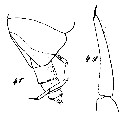 issued from : C. With in The Danish Ingolf-Expedition, Copepoda I, 1915, III, 4. [Pl. VII, Fig. 15, f, g]. Male: f, urosome (lateral); g, left P5 (3rd outer segment).
|
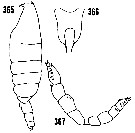 issued from : H.B. Owre & M. Foyo in Fauna Caribaea, 1, Crustacea, 1: Copepoda. Copepods of the Florida Current. [p.58, Figs.365-369]. Female: 365, habitus (lateral); 366, rostrum. Male: 367, P5.
|
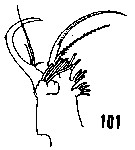 issued from : H.B. Owre & M. Foyo in Fauna Caribaea, 1, Crustacea, 1: Copepoda. Copepods of the Florida Current. [p.24, Fig.101]. Male: Mx2.
|
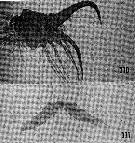 issued from : H.B. Owre & M. Foyo in Fauna Caribaea, 1, Crustacea, 1: Copepoda. Copepods of the Florida Current. [p.58, Figs.370, 371]. Female: 371, P5. Male: 370, Mx2.
|
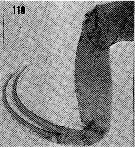 issued from : H.B. Owre & M. Foyo in Fauna Caribaea, 1, Crustacea, 1: Copepoda. Copepods of the Florida Current. [p.25, Fig.110]. Female: Mxp.
|
 Issued from : O. Tanaka in Spec. Publs. Seto mar. biol. Lab., 1960, VIII (1). [p.121, Fig.98]. Immature Male Stage V (from Suruga Bay, Japan): a, forehead (lateral); b, lest thoracic segment and two first abdominal segments (lateral); c, Mx2; d, Mxp; e, P5. Body size: 5.33 mm. Nota: Sewell's immature specimen male taken from the Indian Ocean (measuring 5.4 mm) has no cephalic spine; the P5 legs is of about equal lengths. As a general rule, the immarure male has a general resemblance to the adult female. Sewell describes that the general form of the body closely resembles the figure of Cornucalanus magnus Wolfenden.
| | | | | Compl. Ref.: | | | Sewell, 1948 (p.384, 501, 521, 526, 527); C.B. Wilson, 1950 (p.192); Grice, 1963 a (p.495); Grice & Hulsemann, 1967 (p.16); 1968 (tab.2); Shih & al., 1971 (p.43); Björnberg, 1973 (p.331, 385); Roe, 1972 (p.277, tabl.1, tabl.2); Deevey & Brooks, 1977 (p.256, tab.2, Station "S"); Vives, 1982 (p.291); Tremblay & Anderson, 1984 (p.5); Roe, 1984 (p.357); Razouls & al., 2000 (p.343, tab. 5, Appendix); Holmes, 2001 (p.55); Gaard & al., 2008 (p.59, Table 1, N Mid-Atlantic Ridge); Galbraith, 2009 (pers. comm.); Park & Ferrari, 2009 (p.143, Table 4, 7: common deep water species, Appendix 1, biogeography) | | | | NZ: | 16 | | |
|
Distribution map of Cornucalanus chelifer by geographical zones
|
| | | | | | | | | | Loc: | | | Antarct. (Peninsula, SW Atlant., Indian, SE Pacif.), South Georgia, sub-Antarct. (Indian, SW & SE Pacif.), South Africa, off E Tristan da Cunha, G. of Guinea (off Ghana), Cape Verde Is., off Mauritania, Canary Is., off E Madeira, off W Cape Finisterre, W Bay of Biscay, Azores, Florida, off Bermuda: Station "S" (32°10'N, 64°30'W), Sargasso Sea, Woods Hole, Nova Scotia, S Strait of Davis, Iceland, SW Faroe Is., W Ireland, Denmark Strait, Indian (off S Laccadive Is.), Indonesia-Malaysia, Philippines, Japan (Izu region), Kuril-Kamchatka, British Columbia (rare), New Zealand, off Juan Fernandez Is., Chile (N & S) | | | | N: | 37 | | | | Lg.: | | | (1) F: 8,4; (7) F: 8,7; M: 6,17; (9) F: 7,6; M: 6,3; (10) F: 8-7,8; (15) F: 8,25-7,41; M: 6,66-6,41; (16) M: 5,5; (25) M: 4,85; (45) F: 9-8; M: 7-6,5; (73) M: 5,84-5,82; (199) F: 7,2-6,23; (866) F: 6-8,3; M: 6-6,7; (867) F: 7,2-7,6; {F: 6,00-9,00; M: 4,85-7,00};
For G. Harding (2004, p.41) the total body length is about 8.4 mm (Female) and about 8 mm (Male). | | | | Rem.: | meso-bathypelagic. After Pearson (1906, p.19): vertical range down to 2.200 m at 53°58'N, 12°28'W. Sargasso Sea: 500-1500 m (Deevey & Brooks, 1977, station "S");
For Vervoort (1957, p.92) the female is distinguished by the presence of a short cephalic spine; the claws on the terminal portion of Mxp both are the same type; the basal part has a row of widely spaced, coarse spinules, the apical portion is covered with fine spinules.After Tanaka (1960 a, p.122) the immature male described and figured by Sewell is not identical with C. chelifer
Concerning males see remarks to C. indicus from Tanaka & Omori (1992, p.260-261). | | | Last update : 10/05/2016 | |
|
|
 Any use of this site for a publication will be mentioned with the following reference : Any use of this site for a publication will be mentioned with the following reference :
Razouls C., Desreumaux N., Kouwenberg J. and de Bovée F., 2005-2026. - Biodiversity of Marine Planktonic Copepods (morphology, geographical distribution and biological data). Sorbonne University, CNRS. Available at http://copepodes.obs-banyuls.fr/en [Accessed January 30, 2026] © copyright 2005-2026 Sorbonne University, CNRS
|
|
 |
 |
























